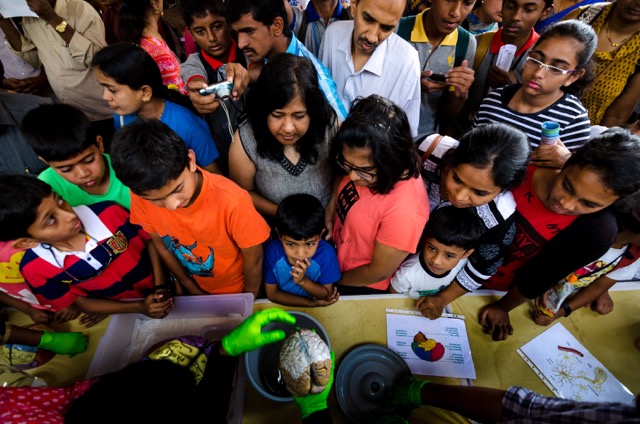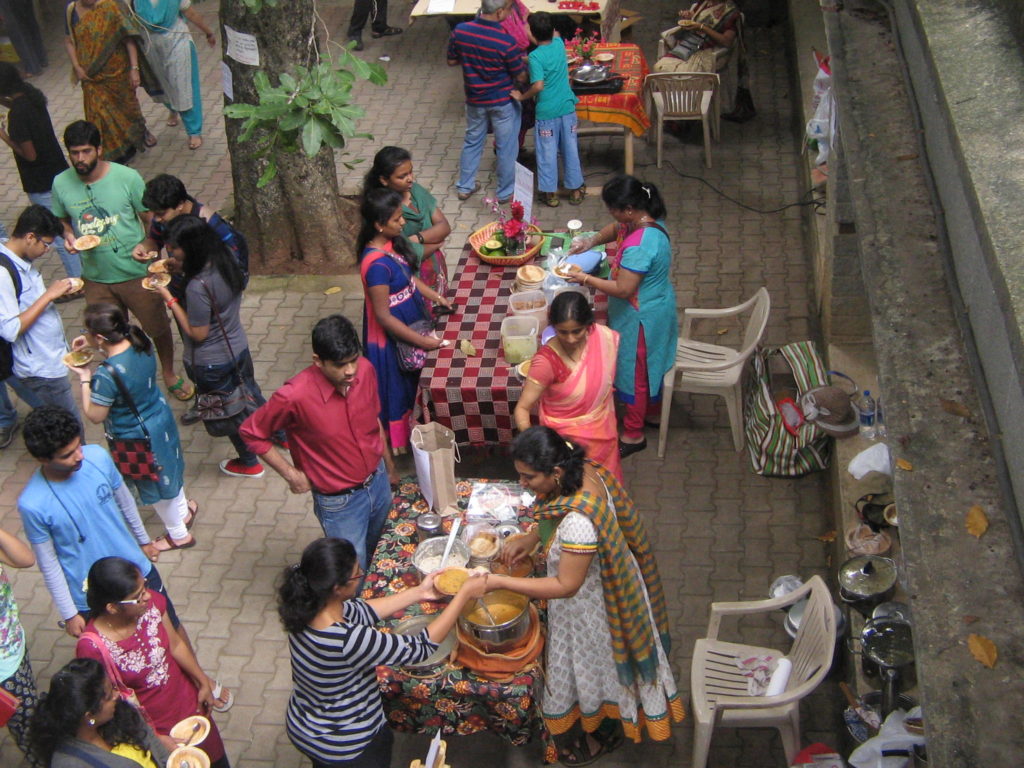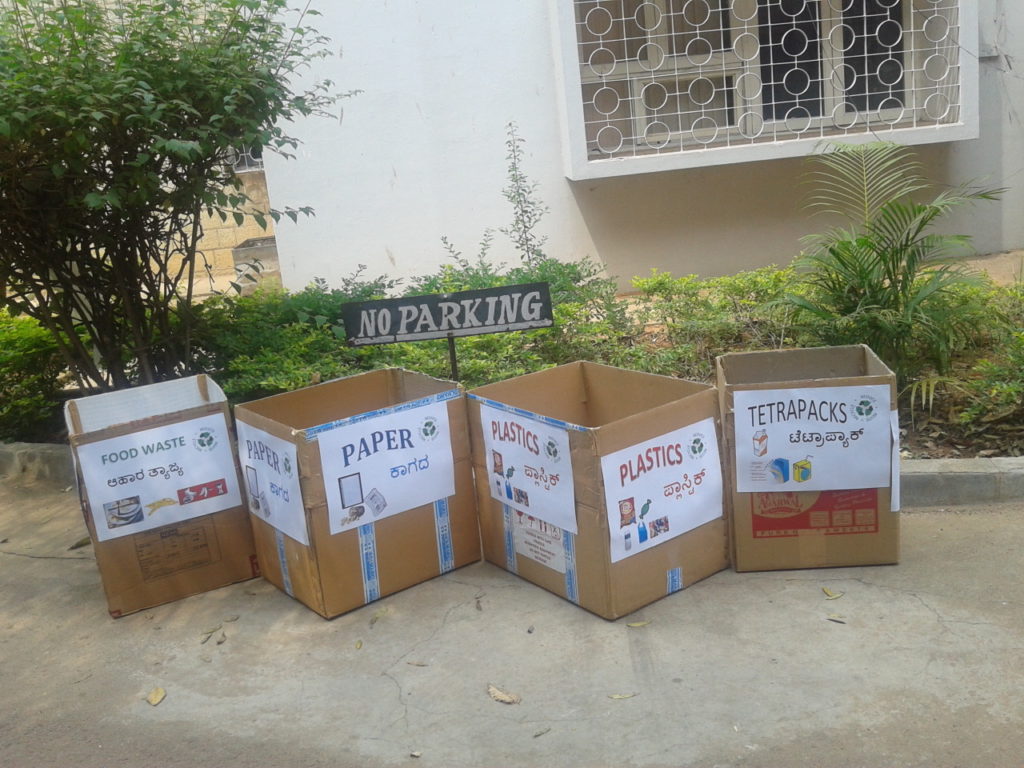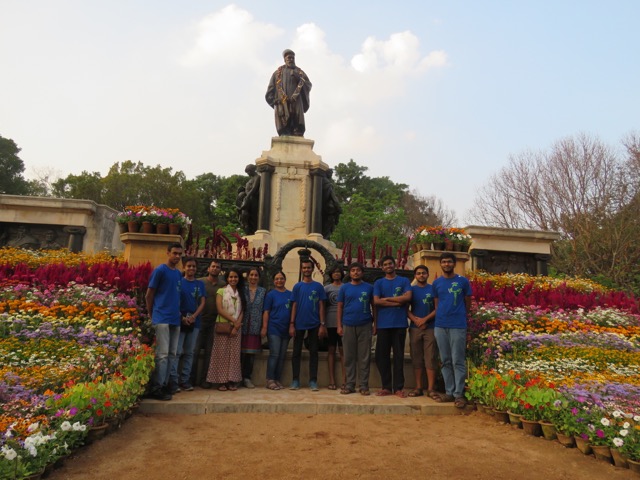
IISc Families and Friends (IFF) is a forum created to provide a platform for voluntary initiatives to work towards improving the quality of life for all those associated with IISc. A major endeavour of this organisation, started in early 2015, is to work for a “clean and green IISc”, which entails reusing and recycling all solid waste produced by the campus residents in a responsible manner.
IFF also brings the campus community together by organising fairs and festivals at regular intervals, the latest of which was the Spring Mela held on 16 April. Home-made food and chaat stalls, arts and crafts stalls, live music and dance performances, games and on-the-spot competitions are the highlights of these events. A major achievement at these events is that waste is managed by following a number of guidelines: people are encouraged to bring their own cutlery (plates, spoons and cups), and if they can’t, food is served in arecanut leaf plates that are composted along with food waste. Using plates made of thermocol, plastic or lined with aluminium foil is strictly prohibited.
People are encouraged to bring their own cutlery, and using plates made of thermocol, plastic or lined with aluminium foil is strictly prohibited
IFF has invested in 400 steel spoons and cups so that plastic spoons and paper cups are not used. Paper cups are a hazard to the environment: they are difficult to recycle (because of their plastic resin waterproof coating), result in loss of trees and add to greenhouse gases, and are bad for our health as we ingest this plastic coating when we drink hot liquids from them. The Spring Mela was the fourth such programme to be conducted that followed all these protocols, and was a huge success with over 400 people taking part. At the Diwali Street Art festival last year, with waste being similarly managed, the members of IFF took an oath to cut down on firecrackers, which are detrimental to the environment, use children in their manufacture, and are a nightmare for the numerous animals on campus.

The biggest challenge IFF has taken up so far is to make IISc’s Open Day a green one. Every year on this day, a huge amount of trash is generated by the thousands of visitors who throng the campus. This year, it was held on 4 March, and saw about 22,000 visitors. IFF’s goal was to ensure that all the trash generated on Open Day doesn’t end up in landfills; paper, plastic and tetra-packs should be recycled and food waste composted. This implies segregation of waste at source, not an easy task when that many people visit the campus. But IFF also saw this as an opportunity to educate them about waste segregation and recycling. This ambitious plan would work only with the full support of the administration, along with voluntary help from students, staff and residents of the campus.
To achieve this, plenty of steps were taken. At all help desks, dustbins were provided for segregation at source and properly labeled for plastic, paper, and food waste. Banners were put up explaining waste segregation. Green volunteers (comprising students, staff and campus residents) instructed visitors on how to use the dustbins properly. Only reusable steel glasses were kept at the water stations with a poster showing why no paper cups would be used.
At all help desks, dustbins were provided for segregation at source and properly labelled for plastic, paper, and food waste
Strict notices were given to all restaurants (like Prakruti and Nesara) on campus specifying that food should be served in arecanut leaf plates. Labeled dustbins for different kinds of waste had to be provided near these places. The use of plastics was minimised as far as possible and thermocol packaging was not used, even for take-outs.

Student volunteers oversaw waste management in and around their departments, made sure the labeled dustbins were provided and took care to see that visitors used the bins properly on Open Day. Many IFF volunteers were in constant touch with the students and chairpersons of the departments to make sure this happened.
IISc Alumni Association also sponsored t-shirts with the message “Reduce-Reuse-Recycle”. All the volunteers (including faculty, students, spouses and campus residents) sported these t-shirts to spread the message. At the end of the day, all the segregated waste was transported to the Solid Waste Management Initiative by IISc (SWaMII) centre – started by the Centre for Infrastructure, Sustainable Transportation and Urban Planning (CiSTUP) – which composted the food waste on campus. Hard plastics, paper and laminated plastics were channeled for recycling through ITC’s WOW (Wealth out of Waste) programme. Eventually all paper was sent by ITC to their paper recycling unit in Coimbatore, hard plastics were given to recyclers in Bangalore and the low-value laminated plastics that cannot be recycled were sent by ITC to the ACC cement plant in Gulbarga.

All the planning and hard work yielded positive results: enormous quantities of waste were recycled and composted (3,100 kg of wet waste, 540 kg of dry waste), which would have otherwise ended up in landfills. The campus was clean at the end of the day; it didn’t look like a place that had just hosted a huge science party for thousands of people.
Enormous quantities of waste were recycled and composted (3,100 kg of wet waste, 540 kg of dry waste), which would have otherwise ended up in landfills
But perhaps the most heartening activity that IFF volunteers embarked upon on this day was to use the event as a teaching moment: they were able to educate the many busloads of children and young adults about the importance waste management and why it is important to segregate waste at the source.
Besides organising festivals and dealing with solid waste segregation on these days, IFF volunteers have been working with SWaMII (Solid Waste Management Initiative by IISc) on a door-to-door campaign educating people about the importance of segregation at source. Now, the segregated garbage pickup by SWaMII has been extended to all the staff quarters and to 31 departments. IISc also has an agreement signed with Sembramky Environmental Management to take care of sanitary waste.
*Bhama Sridharan is one of the driving forces behind the activities of IFF.




